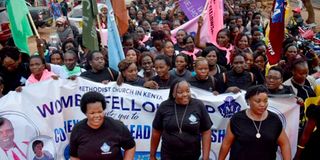Avert cases of poll-related sexual violence

Methodist Church in Kenya Connectional women fellowship leaders during an anti-Gender Based Violence walk on April 21, 2022. Should there be cases of election-related sexual violence next month, the survivors may not access justice.
What you need to know:
- The government has admitted that it failed to prevent and respond to election-related violence in the past.
- Following advocacy by civil society groups, the government has made a few important strides over the past decade.
Kenya’s August 9 General Election will be one of the most competitive in the country’s history.
Deputy President William Ruto will square off against opposition leader Raila Odinga.
In addition, Kenyans will vote for 290 members of the National Assembly, 47 governors, 47 senators, 47 women representatives and 1,450 ward reps spanning 82 political parties.
For decades, elections in Kenya have tragically been roiled by violence.
As we enter the final stretch of the election campaigns, we cannot allow history to repeat itself.
Elections are no excuse for violence. The government has admitted that it failed to prevent and respond to election-related violence in the past.
It must act now to ensure preparedness to respond appropriately if violence is perpetrated in this election season.
Following the 2007 presidential election, political parties, security forces, gangs and individuals fomented and perpetrated violence that led to more than 1,100 deaths.
More than 400 people were reportedly shot by the police.
The post-election catastrophe included widespread and systematic sexual violence perpetrated by state security forces, gangs and individuals.
Some 900 people are estimated to have survived sexual and gender-based violence after the 2007 elections while 201 cases were recorded in nine counties in 2017.
Learn and grow
We must learn and grow from this tragedy through justice, accountability and reform.
Following advocacy by civil society groups, the government has made a few important strides over the past decade.
The National Police Service, for example, has trained some of its officers on how to respond to sexual and gender-based violence.
The national government has developed an election contingency plan and there is some modest coordination among key government sectors on election preparedness.
But the government has not done enough to safeguard the health and well-being of Kenyans as they head to the polls.
It has neither adequately prioritised the prevention of election-related sexual violence, nor has it implemented the range of common-sense policies that human rights researchers and advocates recommend to avert election-related violence.
My greatest concern is that, should there be cases of election-related sexual violence next month, the survivors may not access justice.
Even the survivors of the 2007-8 election-related sexual violence are yet to fully get justice.
The High Court in Nairobi did rule in favour of four out of eight survivor-petitioners in a landmark judgment in 2020, finding that the government was responsible for “failure to conduct independent and effective investigations and prosecutions of (sexual and gender-based violence) crimes during the post-election violence.”
However, the judge failed to recognise or provide redress to four survivors of sexual violence perpetrated by non-state actors.
The survivors are also yet to receive any compensation for their plight.
We cannot move forward unless we reckon with the past. In this regard, the survivors of past election-related violence should be helped to obtain justice and accountability.
Certainly, it is highly challenging to gather court-admissible evidence amid political unrest and communal violence.
Physicians for Human Rights (PHR) has worked for years in partnership with Kenyan clinicians to help the health sector prepare for and respond to sexual violence, but there is still much work to do.
Ultimately, it is the government’s responsibility to train and deploy health professionals in anticipation of potential violence.
Numerous recommendations from Breaking Cycles of Violence: Gaps in Prevention of and Response to Electoral-Related Sexual Violence in Kenya, a 2019 report by UN Women, the UN Office of the High Commissioner for Human Rights, and PHR, have still not been implemented.
Nevertheless, there is much the government can do.
Contingency measures
First, it must prioritise contingency measures. It should widely publicise helplines and other available resources.
The government should also ensure health professionals are well-equipped and police officers are well-placed to respond if need be.
It should fund and coordinate the security forces, first responders, humanitarians and others.
In case of sexual violence, the government should also provide emergency healthcare, including medical forensic services, to survivors.
It must also keep survivors safe, protect their identities and provide them with the necessary legal assistance to report, regardless of the status of the perpetrator.
Furthermore, the government must expedite investigations to ensure perpetrators are held to account.
Every Kenyan has a role to play. All candidates and parties should publicly voice their support for peace, even if election results are close or contested.
Any officials who are involved directly or indirectly with election-related violence should not occupy an office.
Ms Naitore Nyamu-Mathenge, an expert on human rights and sexual violence, is the head of the Kenya office, of Physicians for Human Rights. @NaitoreNyamu




